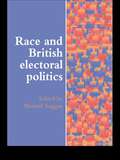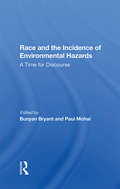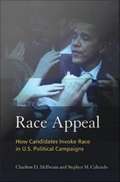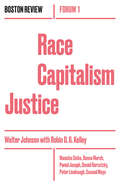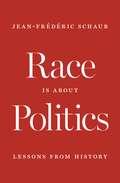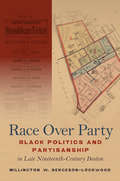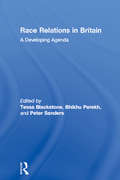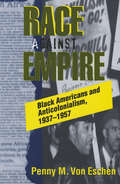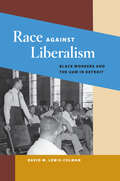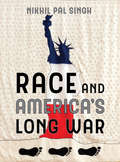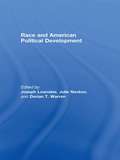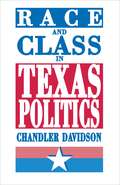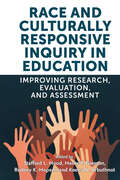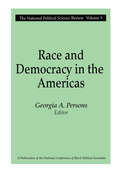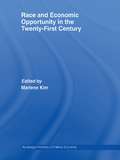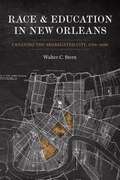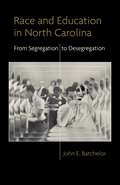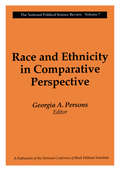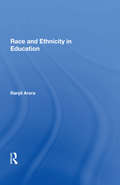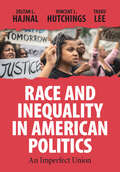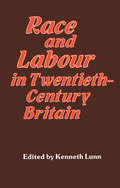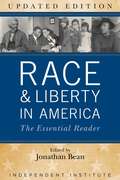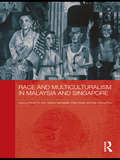- Table View
- List View
Race And British Electoral Politics
by Shamit SaggarThis text examines key themes pertaining to the study of race and electoral politics. Addressing an issue which is of immense topical interest, it offers comprehensive coverage of key topics. Providing both an historical and theoretical analysis of race and ethnicity in politics, the contributors examine the participation and influence of ethnic minorities in electoral politics at both ends of the political spectrum. "Race and British Electoral Politics" should be of value for students studying British politics, particularly those taking course options on electoral politics, race, ethnicity and comparative politics.
Race And The Incidence Of Environmental Hazards: A Time For Discourse
by Bunyan Bryant Paul MohaiThis book discusses the poor and people of color and their struggle to take control of one of the most basic aspects of their lives: the quality of their environment. It exposes the fact of environmental inequity and its consequences in face of general neglect by policymakers and social scientists.
Race Appeal: How Candidates Invoke Race in U.S. Political Campaigns
by Charlton D. Mcilwain Stephen M. CaliendoIn our evolving American political culture, whites and blacks continue to respond very differently to race-based messages and the candidates who use them. Race Appeal examines the use and influence such appeals have on voters in elections for federal office in which one candidate is a member of a minority group. Charlton McIlwain and Stephen Caliendo use various analysis methods to examine candidates who play the race card in political advertisements. They offer a compelling analysis of the construction of verbal and visual racial appeals and how the news media covers campaigns involving candidates of color. Combining rigorous analyses with in-depth case studies-including an examination of race-based appeals in the historic 2008 presidential election-Race Appeal is a groundbreaking work that represents the most extensive and thorough treatment of race-based appeals in American political campaigns to date.
Race Capitalism Justice (Boston Review / Forum #1)
by Robin D. G. Kelley Walter JohnsonRace Capitalism Justice urges us to embrace a vision of justice attentive to the history of slavery not through the lens of human rights, but instead through an honest accounting of how slavery was the foundation of capitalism, a legacy that continues to afflict people of color and the poor. Inspired by Cedric J. Robinson's work on racial capitalism, as well as Black Lives Matter and its forebears including the black radical tradition, the Black Panthers, South African anti-apartheid struggles, and organized labor, contributors to this volume offer a critical handbook to racial justice in the age of Trump.
Race Is about Politics: Lessons from History
by Jean-Frédéric SchaubHow the history of racism without visible differences between people challenges our understanding of the history of racial thinkingRacial divisions have returned to the forefront of politics in the United States and European societies, making it more important than ever to understand race and racism. But do we? In this original and provocative book, acclaimed historian Jean-Frédéric Schaub shows that we don't—and that we need to rethink the widespread assumption that racism is essentially a modern form of discrimination based on skin color and other visible differences. On the contrary, Schaub argues that to understand racism we must look at historical episodes of collective discrimination where there was no visible difference between people. Built around notions of identity and otherness, race is above all a political tool that must be understood in the context of its historical origins.Although scholars agree that races don't exist except as ideological constructions, they disagree about when these ideologies emerged. Drawing on historical research from the early modern period to today, Schaub makes the case that the key turning point in the political history of race in the West occurred not with the Atlantic slave trade and American slavery, as many historians have argued, but much earlier, in fifteenth-century Spain and Portugal, with the racialization of Christians of Jewish and Muslim origin. These Christians were discriminated against under the new idea that they had negative social and moral traits that were passed from generation to generation through blood, semen, or milk—an idea whose legacy has persisted through the age of empires to today.Challenging widespread definitions of race and offering a new chronology of racial thinking, Schaub shows why race must always be understood in the context of its political history.
Race Over Party: Black Politics and Partisanship in Late Nineteenth-Century Boston
by Millington W. Bergeson-LockwoodIn late nineteenth-century Boston, battles over black party loyalty were fights over the place of African Americans in the post–Civil War nation. In his fresh in-depth study of black partisanship and politics, Millington W. Bergeson-Lockwood demonstrates that party politics became the terrain upon which black Bostonians tested the promise of equality in America's democracy. Most African Americans remained loyal Republicans, but Race Over Party highlights the actions and aspirations of a cadre of those who argued that the GOP took black votes for granted and offered little meaningful reward for black support. These activists branded themselves "independents," forging new alliances and advocating support of whichever candidate would support black freedom regardless of party.By the end of the century, however, it became clear that partisan politics offered little hope for the protection of black rights and lives in the face of white supremacy and racial violence. Even so, Bergeson-Lockwood shows how black Bostonians' faith in self-reliance, political autonomy, and dedicated organizing inspired future generations of activists who would carry these legacies into the foundation of the twentieth-century civil rights movement.
Race Relations in Britain: A Developing Agenda
by Bhikhu Parekh Peter Sanders Tessa BlackstoneBringing together distinguished experts in the field of race relations this book addresses questions which are increasingly relevant in the current socio-political context of Great Britain. The kind of visions of multicultural Britain which are currently being canvassed and the problems which ethnic minorities continue to face are addressed, together with an examination of the new policy initiatives which are needed to tackle these problems. Race Relations in Britain falls into three parts which:* analyse contemporary trends, articulating a vision of multicultural Britain and exploring important theoretical controversies* identify the obstacles that stand in the way of a racism-free Britain, looking at current policy in areas such as immigration, employment, education, the criminal justice system as well as the role of the media* offer a vision of a multi-cultural Britain, advancing new policies based on current research.
Race against Empire: Black Americans and Anticolonialism, 1937–1957
by Penny M. Von EschenDuring World War II, African American activists, journalists, and intellectuals forcefully argued that independence movements in Africa and Asia were inextricably linkep to political, economic, and civil rights struggles in the United States. Marshaling evidence from a wide array of international sources, including the black presses of the time, Penny M. Von Eschen offers a vivid portrayal of the African diaspora in its international heyday, from the 1945 Manchester Pan-African Congress to early cooperation with the United Nations.Race against Empire tells the poignant story of a popular movement and its precipitate decline with the onset of the Cold War. Von Eschen documents the efforts of African-American political leaders, intellectuals, and journalists who forcefully promoted anti-colonial politics and critiqued U.S. foreign policy. The eclipse of anti-colonial politics--which Von Eschen traces through African-American responses to the early Cold War, U.S. government prosecution of black American anti-colonial activists, and State Department initiatives in Africa--marked a change in the very meaning of race and racism in America from historical and international issues to psychological and domestic ones. She concludes that the collision of anti-colonialism with Cold War liberalism illuminates conflicts central to the reshaping of America; the definition of political, economic, and civil rights; and the question of who, in America and across the globe, is to have access to these rights.Exploring the relationship between anticolonial politics, early civil rights activism, and nascent superpower rivalries, Race against Empire offers a fresh perspective both on the emergence of the United States as the dominant global power and on the profound implications of that development for American society.
Race against Liberalism: Black Workers and the UAW in Detroit (Working Class in American History)
by David M. Lewis-ColmanRace against Liberalism examines how black worker activism in Detroit shaped the racial politics of the labor movement and the white working class. David M. Lewis-Colman traces the substantive, long-standing disagreements between liberals and the black workers who embraced autonomous race-based action. As he shows, black autoworkers placed themselves at the center of Detroit's working-class politics and sought to forge a kind of working class unity that accommodated their interests as African Americans. The book covers the independent caucuses in the 1940s and the Trade Union Leadership Council in the 1950s; the black power movement and Revolutionary Union Movements of the mid-1960s; and the independent race-based activism of the 1970s that resulted in Coleman Young's 1973 election as the city's first black mayor.
Race and America's Long War
by Nikhil Pal SinghDonald Trump’s election to the U.S. presidency in 2016, which placed control of the government in the hands of the most racially homogenous, far-right political party in the Western world, produced shock and disbelief for liberals, progressives, and leftists globally. Yet most of the immediate analysis neglects longer-term accounting of how the United States arrived here. Race and America’s Long War examines the relationship between war, politics, police power, and the changing contours of race and racism in the contemporary United States. Nikhil Pal Singh argues that the United States’ pursuit of war since the September 11 terrorist attacks has reanimated a longer history of imperial statecraft that segregated and eliminated enemies both within and overseas. America’s territorial expansion and Indian removals, settler in-migration and nativist restriction, and African slavery and its afterlives were formative social and political processes that drove the rise of the United States as a capitalist world power long before the onset of globalization. Spanning the course of U.S. history, these crucial essays show how the return of racism and war as seemingly permanent features of American public and political life is at the heart of our present crisis and collective disorientation.
Race and American Political Development
by Julie Novkov Joseph Lowndes Dorian T. WarrenRace has been present at every critical moment in American political development, shaping political institutions, political discourse, public policy, and its denizens’ political identities. But because of the nature of race—its evolving and dynamic status as a structure of inequality, a political organizing principle, an ideology, and a system of power—we must study the politics of race historically, institutionally, and discursively. Covering more than three hundred years of American political history from the founding to the contemporary moment, the contributors in this volume make this extended argument. Together, they provide an understanding of American politics that challenges our conventional disciplinary tools of studying politics and our conservative political moment’s dominant narrative of racial progress. This volume, the first to collect essays on the role of race in American political history and development, resituates race in American politics as an issue for sustained and broadened critical attention.
Race and Citizen Identity in the Classical Athenian Democracy
by Susan LapeIn Race and Citizen Identity in the Classical Athenian Democracy, Susan Lape demonstrates how a race ideology grounded citizen identity. Although this ideology did not manifest itself in a fully developed race myth, its study offers insight into the causes and conditions that can give rise to race and racisms in both modern and pre-modern cultures. In the Athenian context, racial citizenship emerged because it both defined and justified those who were entitled to share in the political, symbolic, and socioeconomic goods of Athenian citizenship. By investigating Athenian law, drama, and citizenship practices, this study shows how citizen identity worked in practice to consolidate national unity and to account for past Athenian achievements. It also considers how Athenian identity narratives fueled Herodotus' and Thucydides' understanding of history and causation.
Race and Class in Texas Politics
by Chandler DavidsonThis major work on Texas politics explores the complicated relations between the politically disorganized Texas blue-collar class and the "rich and the fabulously rich," whose interests have been protected by "brilliant practitioners of horse trading, guile, the jovial but serious threat, the offer that can't be refused."
Race and Culturally Responsive Inquiry in Education: Improving Research, Evaluation, and Assessment (Race and Education)
by Stafford L. Hood, Henry T. Frierson, Rodney K. Hopson and Keena N. ArbuthnotRace and Culturally Responsive Inquiry in Education examines how assumptions about race and culture have shaped US education research and the interpretation and implementation of its results.This ambitious volume sheds light on the detrimental effects of educational praxis and policies that have characterized communities of color and historically underserved communities as deficient. It reveals how such bias has affected many facets of educational inquiry, from research design and planning to education policy making and evaluation practices. The provocative essays in this work challenge traditional suppositions about whose evidence matters, highlighting approaches for reframing educational inquiry and arguing for the adoption of a culturally responsive stance that can correct inequities by accounting for students&’ diverse backgrounds and needs.Edited by Stafford L. Hood, Henry T. Frierson, Rodney K. Hopson, and Keena N. Arbuthnot and featuring contributions from leading and emerging scholars, the collection is organized around three key areas—education research, educational assessment, and program evaluation. The contributors identify provocative problems that exist at the intersection of race and education in these areas, and they illuminate the many ways in which education reform can address intersectionality. Calling for effective action, they suggest compelling solutions for consideration by policy makers and practitioners as well as researchers.Together, the essays in this volume make the case that culturally responsive methods that deepen our understanding of educational disparities, appropriately measure what students know and can do, and ensure that we have accurate information about the effectiveness of educational interventions can improve educational outcomes for diverse learners.
Race and Democracy in the Americas (National Political Science Review Ser. #Vol. 9)
by Georgia A. PersonsRace and Democracy in the Americas examines dimensions of the comparative dynamics of race and ethnicity, with a directed focus on the Americas, most particularly Brazil and the United States. Brazil and the United States are two countries in the Americas that have been major hosts for the African diaspora. Both countries experienced prolonged enslavement of Africans and both now claim to be beacons of democracy for much of the developing world. Both Afro-Brazilians and African Americans have fielded major liberation movements against racism and oppression yet both groups continue to experience considerable residual racial discrimination and displacement. Brazil and the U.S. remain racialized societies though both officially purport to be otherwise.The chapters of this volume illuminate a common search for understanding how race operates in societies generally, and how shapes life opportunities for African Americans and Afro-Brazilians, both oppressed by this most detrimental social construction. The project that fueled this volume represented a rare opportunity for collaboration between Afro-Brazilian scholars and their African American counterparts.This volume offers a passionate conversation between colleagues who have endured common sociopolitical and cultural struggles, but who have only belatedly been able to meet and connect as individuals. Both groups share identities as scholars and activists, for neither identity alone is sufficient to nourish the longings of their hearts nor of their consciences. This volume also represents an all too rare opportunity to give voice and expression to the work of Afro-Brazilian scholars.Volume 9 of the National Political Science Review also carries a special tribute to Mack Henry Jones, a senior black political scientist retiring from Atlanta University and honors Jones's legacy and continues his quest for understanding the nature and intricacies of oppression and possible paths to liberatio
Race and Economic Opportunity in the Twenty-First Century (Routledge Frontiers Of Political Economy Ser. #Vol. 90)
by Marlene KimExamining the crucial topic of race relations, this book explores the economic and social environments that play a significant role in determining economic outcomes and why racial disparities persist. With contributions from a range of international contributors including Edward Wolff and Catherine Weinberger, the book compares how various racial g
Race and Education in New Orleans: Creating the Segregated City, 1764-1960 (Making the Modern South)
by Walter SternSurveying the two centuries that preceded Jim Crow’s demise, Race and Education in New Orleans traces the course of the city’s education system from the colonial period to the start of school desegregation in 1960. This timely historical analysis reveals that public schools in New Orleans both suffered from and maintained the racial stratification that characterized urban areas for much of the twentieth century.Walter C. Stern begins his account with the mid-eighteenth-century kidnapping and enslavement of Marie Justine Sirnir, who eventually secured her freedom and played a major role in the development of free black education in the Crescent City. As Sirnir’s story and legacy illustrate, schools such as the one she envisioned were central to the black antebellum understanding of race, citizenship, and urban development. Black communities fought tirelessly to gain better access to education, which gave rise to new strategies by white civilians and officials who worked to maintain and strengthen the racial status quo, even as they conceded to demands from the black community for expanded educational opportunities. The friction between black and white New Orleanians continued throughout the nineteenth century and well into the twentieth, when conflicts over land and resources sharply intensified. Stern argues that the post-Reconstruction reorganization of the city into distinct black and white enclaves marked a new phase in the evolution of racial disparity: segregated schools gave rise to segregated communities, which in turn created structural inequality in housing that impeded desegregation’s capacity to promote racial justice.By taking a long view of the interplay between education, race, and urban change, Stern underscores the fluidity of race as a social construct and the extent to which the Jim Crow system evolved through a dynamic though often improvisational process. A vital and accessible history, Race and Education in New Orleans provides a comprehensive look at the ways the New Orleans school system shaped the city’s racial and urban landscapes.
Race and Education in North Carolina: From Segregation to Desegregation (Making the Modern South)
by John E. BatchelorThe separation of white and black schools remained largely unquestioned and unchallenged in North Carolina for the first half of the twentieth century, yet by the end of the 1970s, the Tar Heel State operated the most thoroughly desegregated school system in the nation. In Race and Education in North Carolina, John E. Batchelor, a former North Carolina school superintendent, offers a robust analysis of this sea change and the initiatives that comprised the gradual, and often reluctant, desegregation of the state's public schools. In a state known for relative racial moderation, North Carolina government officials generally steered clear of fiery rhetorical rejections of Brown v. Board of Education, in contrast to the position of leaders in most other parts of the South. Instead, they played for time, staving off influential legislators who wanted to close public schools and provide vouchers to support segregated private schools, instituting policies that would admit a few black students into white schools, and continuing to sanction segregation throughout most of the public education system. Litigation--primarily initiated by the NAACP--and the Civil Rights Act of 1964 created stronger mandates for progress and forced government officials to accelerate the pace of desegregation. Batchelor sheds light on the way local school districts pursued this goal while community leaders, school board members, administrators, and teachers struggled to balance new policy demands with deeply entrenched racial prejudice and widespread support for continued segregation. Drawing from case law, newspapers, interviews with policy makers, civil rights leaders, and attorneys involved in school desegregation, as well as previously unused archival material, Race and Education in North Carolina presents a richly textured history of the legal and political factors that informed, obstructed, and finally cleared the way for desegregation in the North Carolina public education system.
Race and Ethnicity in Comparative Perspective
by Georgia A. PersonsContradictory forces are at play at the close of the twentieth century. There is a growing closeness of peoples fueled by old and new technologies of modern aviation, digital-based communications, new patterns of trade and commerce, and growing affluence of significant portions of the world's population. Television permits individuals around the world to learn about the cultures and lifestyles of peoples of physically distant lands. These developments give real meaning to the notion of a global village. Peoples of the world are growing closer in new and increasingly important ways.Nonetheless, there are disturbing signs of a growing awareness of ethnic differences in all parts of the world the United States included and a concomitant rise in ethnic-based conflicts, many of them extraordinarily violent in nature. Fear, resentment, intoler-ance, and mistreatment of the "other" abound in world news accounts. Not only does this phenomenon pose an interesting juxtaposition to the concept of the emergent glo-bal village, but its emergence in the post-cold war era internationally and the post-civil rights era in the United States raises significant and compelling questions. Why are such conflicts occurring now? How do analysts explain these developments?The essays in Race and Ethnicity in Comparative Perspective lucidly explore some of the complexities of the persistence and re-emergence of race and ethnicity as major lines of divisiveness around the world. Contributors analyze manifestations of race-based movements for political empowerment in Europe and Latin America as well as racial intolerance in these same settings. Attention is also given to the conceptual complexi-ties of multidimensional and shared cultural roots of the overlapping phenomena of ethnicity, nationalism, identity, and ideology. The book greatly informs discussions of race and ethnicity in the international context and provides an interesting perspective against which to view America's changing problem of race. Race and Ethnicity in Com-parative Perspective is a timely, thought-provoking volume that will be of immense value to ethnic studies specialists, African American studies scholars, political scientists, his-torians, and sociologists.
Race and Ethnicity in Education (Monitoring Change In Education Ser.)
by Ranjit AroraThis publication is primarily intended for teachers, student teachers and for staff in teacher training institutions. It will also be of use to staff in further, higher and adult education. It is primarily about issues of race and ethnicity in education and includes an examination of the relationship between policies and practices concerned with equal opportunities, both in schools and in teacher training institutions. The central theme of this book is the preparation of all teachers, through initial teacher training, to implement equal opportunities in schools and to provide education for a positively diverse society. A secondary theme is that of the recruitment, training and employment of minority ethnic teachers in British educational institutions. The organization of this book allows the author to address the two central issues, as identified above, in the context of policies and practices as they have developed over the last two decades. It begins with a discussion about equality in the context of issues of quality, followed by a discussion of race and education in its historical context. It includes a historical and contemporary review of issues concerned with two major aspects of teacher education in relation to ethnic minorities. Recent developments in initial teacher education and issues of partnership with schools are explored with a view to identifying the needs of schools. The book ends with an in-depth discussion of equality assurance in education and offers a framework for permeation as well as an agenda for action for all concerned with education.
Race and Imperial Defence in the British World, 1870–1914
by John C. MitchamThe first comprehensive account of the cultural and racial origins of the imperial security partnership between Britain, Canada, Australia, New Zealand, and South Africa. Drawing on research from every corner of the globe, John C. Mitcham merges studies of diplomacy, defense strategy, and politics with a wider analysis of society and popular culture, and in doing so, poses important questions about race, British identity, and the idea of empire. The book examines diverse subjects such as the South African War, the Anglo-German naval arms race, Queen Victoria's Diamond Jubilee, and the birth of the Boy Scout Movement, and positions them within the larger phenomenon of British race patriotism that permeated the fin de siècle. Most importantly, Mitcham demonstrates how this shared concept of 'Britishness' gradually led to closer relations between the self-governing states of the empire, and ultimately resulted in a remarkably unified effort during the First World War.
Race and Inequality in American Politics: An Imperfect Union
by Zoltan L. Hajnal Taeku Lee Vincent L. HutchingsAuthored by three of the USA's most well-known scholars on American politics, this undergraduate textbook argues that racial considerations are today-and have always been since the nation's founding-central to understanding America's political system writ large. Drawing on decades of teaching experience and compelling original research, Hajnal, Hutchings, and Lee present an up-to-date and comprehensive survey of race's role in American democracy, spanning topics as wide-ranging as public opinion, voting behavior, media representation, criminal justice, social policy, and protest movements. The reader will examine the perspectives of multiple racial groups, learn how to bring empirical analysis to bear on deeply divided viewpoints, and debate solutions to the many problems of governance in an America that is polarized by party, riven by race, and divided by inequality. Chapters open with a vignette to introduce the core issues and conclude with discussion questions and annotated suggested readings. Full color photos, figures, and boxed features elaborate on and reinforce important themes. Instructor resources are available online.
Race and Labour in Twentieth-Century Britain
by Kenneth LunnThis collection of essays was put together with a view to furthering the study of the history of immigration into Britain. Naturally enough, a good deal of attention in recent years has been directed at 'race relations' in Britain from the 1960s onwards. As Peter Fryer's study, Staying Power (1984), has shown, there is a rich and important history of black settlement before these years and its significance in shaping responses towards more recent migrants has still to be adequately evaluated. We are constantly being reminded of the legacy of empire and its importance in terms of influencing current policy and attitudes.
Race and Liberty in America: The Essential Reader
by Jonathan BeanIn this long-awaited updated edition of Race & Liberty in America: The Essential Reader, editor Jonathan Bean presents the timeless and urgent insights classical liberalism has to offer our troubled and polarized time.In 2009, when Race & Liberty in America: The Essential Reader was originally published, there was a spirit of optimism surrounding race relations. Fifteen years later, a far different spirit prevails: one fraught with tensions, many regrettably familiar and some new. Which raises the question: What happened? And more importantly: How can we set things right? With new contributions from Thomas Sowell, Coleman Hughes, Thomas Chatterton Williams, Wilfred Reilly, Kenny Xu, David Bernstein, and Ilya Somin—as well as a plethora of primary source evidence from recent landmark US Supreme Court decisions—Bean champions the values of colorblindness, freedom, and equal constitutional protection for all individuals—regardless of race. It&’s a message that couldn&’t be more timely. This first collection of writings on race and immigration to document the role of the classical liberal tradition—a tradition rooted in natural law principles of individual rights and liberty—reveals: Why classical liberals have espoused &“unalienable Rights&” derived from God, individual freedom from government control, the Constitution as a guarantor of freedom, color-blind law, and capitalism; How classical liberals led the fights against slavery and racism against seemingly insurmountable odds and long before such positions became popular; What classical liberals&’ defense of a &“natural right&” to migration implies for today&’s immigration controversies; How capitalism undermines racism by penalizing those who act on their &“taste for discrimination&”; Why America&’s obtuse preoccupation with left-versus-right politics overshadows solutions to racial division; How we can improve race relations in the United States today; And much, much more… From the Declaration of Independence, the antislavery movement, post–Civil War reconstruction, the Progressive Era, the Great Depression and World War II, the civil rights era, George Floyd and Black Lives Matter, all the way up to the present day—each chapter in this new and improved updated edition illuminates how specific time periods in American history grappled with the demands of equality. Citing such influential Americans as Thomas Jefferson, Louis Marshall, Frederick Douglass, Booker T. Washington, and Zora Neale Hurston, plus those missing from other books and heretofore lost to history, Bean shows how classical liberal thought on race relations has helped shape both law and public opinion … and how it will need to do so again, if America as we know it is to prosper and thrive. If you&’re ready to trade the tired and failed left-versus-right politics for timeless principles that actually work and uplift societies, read Race & Liberty in America.
Race and Multiculturalism in Malaysia and Singapore (Routledge Malaysian Studies Series)
by Philip Holden Daniel P.S. Goh Matilda Gabrielpillai Gaik Cheng KhooThis book explores race and multiculturalism in Malaysia and Singapore from a range of different disciplinary perspectives, showing how race and multiculturalism are represented, how multiculturalism works out in practice, and how attitudes towards race and multiculturalism – and multicultural practices – have developed over time. Going beyond existing studies – which concentrate on the politics and public aspects of multiculturalism – this book burrows deeper into the cultural underpinnings of multicultural politics, relating the subject to the theoretical angles of cultural studies and post-colonial theory; and discussing a range of empirical examples (drawn from extensive original research, covering diverse practices such as films, weblogs, music subcultures, art, policy discourse, textbooks, novels, poetry) which demonstrate overall how the identity politics of race and intercultural interaction are being shaped today. It concentrates on two key Asian countries particularly noted for their relatively successful record in managing ethnic differences, at a time when many fast-developing Asian countries increasingly have to come to terms with cultural pluralism and migrant diversity.
